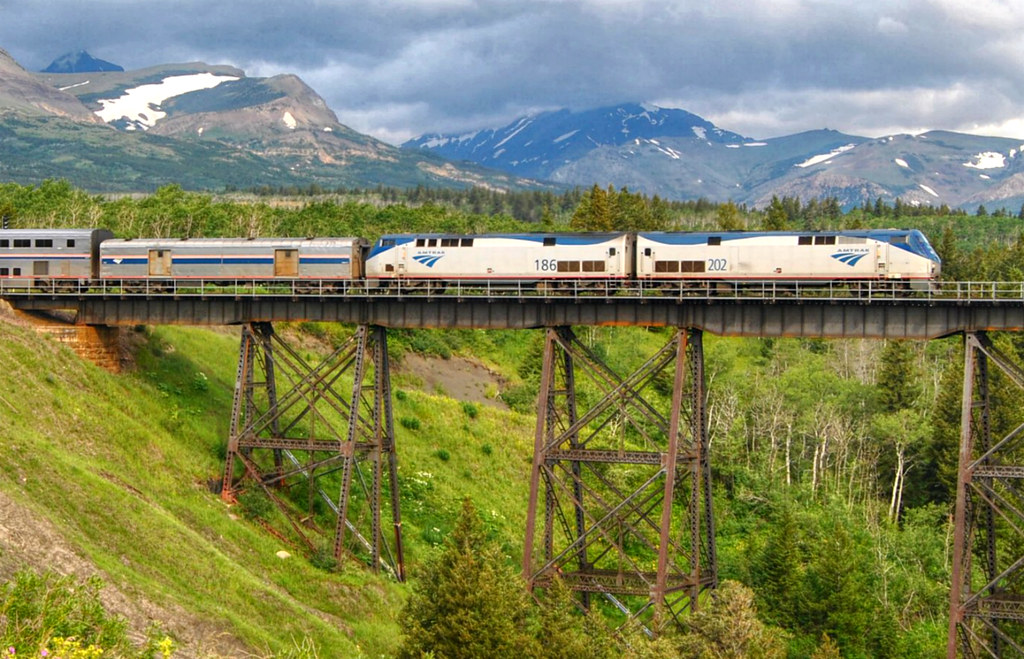
Two Medicine Trestle is a scenic train observation spot located in Glacier National Park, Montana. It offers breathtaking views of the surrounding mountains and valleys as trains cross the historic trestle bridge. This vantage point is popular among photographers and nature enthusiasts for its stunning landscapes.
Photos
Sign in to upload photos
No Photos Yet
Be the first to share photos of this location!
Two Medicine Trestle – East Glacier Park, Montana, USA | Train Spotting Location
Trainspotting Experience
Most visitors set up on the publicly accessible hillside south of the trestle, where a gently rising knoll grants an unobstructed, side-on view of the bridge and river gorge. Expect to hear locomotives long before they appear: dynamic brakes whine on westbounds descending from Marias Pass, while eastbounds throttle up after climbing the Continental Divide. Trains typically cruise at 35–45 mph over the span, giving ample time to frame shots yet maintaining enough speed to showcase modern railroading’s raw power. Rolling stock can stretch well beyond 7,000 ft, so you will see containers, grain hoppers, and tank cars curve onto the bridge for minutes at a time. The soundscape is rich—steel wheels rumble, couplers squeal, and canyon walls magnify every note.
Landscape, Setting & Local Atmosphere
The trestle sits around 4,700 ft above sea level in the foothills of Glacier National Park. Lodgepole pine, Douglas-fir, and aspen cover the slopes, their greens contrasting with the rust-brown steelwork and turquoise river below. From late spring through early autumn, wildflowers dot the meadows; in October golden larch and aspen foliage ignite the valley. Weather changes swiftly: summer afternoons often bring 75 °F sun, yet a fast-moving mountain storm can drop temperatures by 20 degrees. Winter is harsh—deep snow, subzero windchill, and occasional hoar frost coating the bridge—creating dramatic photo opportunities for the prepared railfan. Serenity rules here: aside from the highway hum far in the distance, the only interruptions are rushing water, wind in the trees, and the approach of the next manifest freight.
Type & Frequency of Train Activity
Two Medicine Trestle lies on BNSF Railway’s Hi-Line Subdivision, a core artery between the Pacific Northwest and Chicago. On a typical day, 25–30 freight trains traverse the bridge, dominated by BNSF but with regular run-through power from Union Pacific, Canadian Pacific Kansas City, and Norfolk Southern. You will see:
• Double-stack intermodal blocks hauling Asian imports to Midwest hubs.
• Unit grain and soybean trains serving northern plains elevators.
• Mixed manifest freights with lumber, petroleum, and automotive traffic.
Passenger action is limited but iconic: Amtrak’s Empire Builder crosses the trestle twice daily—westbound in the late morning and eastbound just after sunset, depending on timetable and dispatching conditions.
Best Angles for Photos & What Railfans Enjoy Most
- South Knoll (primary spot): A short trail leads to a grassy rise about 200 yd from the bridge. Morning sun lights up eastbounds; late afternoon glow backlights westbounds, turning locomotives into silhouettes against alpenglow peaks.
- Riverbank Below: Adventurous photographers descend an informal path to river level for dramatic low-angle shots looking up at the latticework. Use wide-angle lenses to capture the full height (nearly 200 ft) of the towers.
- East Embankment: From the opposite side you can frame trains emerging from the pine forest and rolling onto the span, with Triple Divide Peak visible on clear days.
Neutral-density filters help balance bright sky and dark steel. Drone use is restricted near park boundaries, so check regulations before flight.
Historical or Cultural Relevance
Completed in 1901 by the Great Northern Railway during its final push to conquer the Continental Divide, the bridge replaced an earlier timber structure that washed out in spring floods. Its construction allowed the railroad to smooth grades approaching Marias Pass, cutting hours off transcontinental schedules. The trestle’s survival of multiple 20th-century floods and an infamous 1939 windstorm is a testament to early steel design. For the Blackfeet Nation, whose reservation line lies several miles east, the Two Medicine corridor has long been a travel route and cultural landscape, and trains today pass near traditional winter campsites.
What Makes This Spot Different
While many railfan sites in Montana offer wide vistas, Two Medicine pairs intense main-line traffic with a single, photogenic structure that dominates the valley, letting you capture an entire train in one frame against a dramatic mountain backdrop. Few other locations allow you to watch a modern intermodal train roll 200 ft above whitewater rapids while alpine peaks loom in the same shot. The combination of acoustics, elevation, and relative solitude means every passage feels personal and visceral—unlike busier, road-side viewpoints along the Hi-Line.
Localisation
Coordonnées :48.454452, -113.210006
Seasonal Information
Two Medicine Trestle in Glacier National Park offers stunning views year-round. Spring and fall provide mild weather and vibrant scenery, while summer offers long daylight hours. Winter can be picturesque with snow, but check for train schedules and weather conditions.
Other Interesting Locations
Looking for more spots? Browse the complete list of train spotting locations.
Quick Information
Country
USA
Region / State / Province
Montana
City
East Glacier Park
Spot Type
Bridge
Best Times
Best hours: Early morning (7-9 AM) and late afternoon (4-6 PM) for optimal lighting and frequent train crossings.
Access & Amenities
Parking
Not available
Shelter
Not available
Restrooms
Not available
